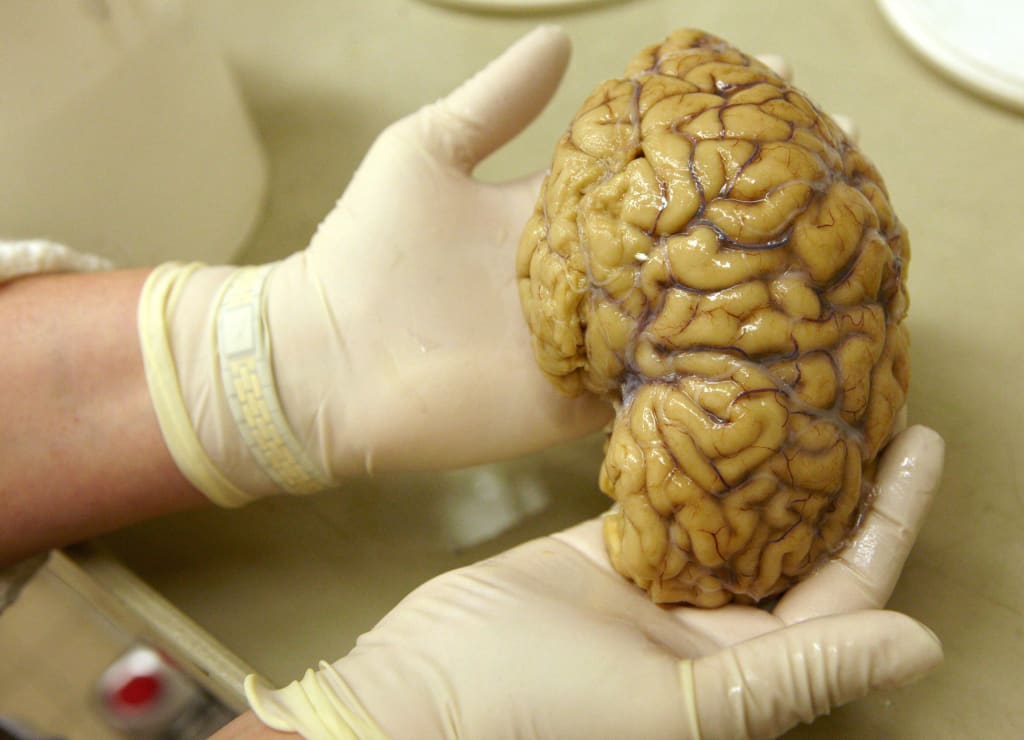What happens if you don't have your brain?
By NyumbiBombi

What happens if you don't have your brain?
I mean,
you would need your brain to understand the words that I was speaking, and you would need your brain to decide whether or not you liked what you were hearing. You would also need your brain to move your muscles in just the right way to click and start reading this article.
In fact, you need your brain to do a lot of stuff and without a brain, well, you can't do much
of anything at all. So, literally speaking, is there really such a thing as a "no-brainer?"
Let's begin with no-header...decapitation. It's a macabre subject, I know, but what's the matter? Are you chicken? Ok, good. Because Mike certainly was.
In 1945, farmer Lloyd Olsen went out to grab a chicken for supper. He cut the chicken's head off and it didn't die. Mike The Headless Chicken lived for another 18 months.
He toured the country and surprised onlookers. He could walk and perch and was fed by putting little drops of water or pieces of grain down his throat.
But here's the thing. Mike The Headless Chicken's actions weren't a no-brainer, because even though he didn't have much of what we would call a "head" left, he did have a bit of his brain stem.
If we want a clearer no-brainer, we're going to have to look at an even more simple creature, the cockroach. These guys don't even breath through their heads so, without one, they're fine. Instead, they breath through holes all over their bodies. And instead of being controlled
by a big, massive brain, they have little bundles of nerves, ganglia, throughout their body, and so, even without any head parts, even when completely decapitated, a cockroach can live for weeks. It can walk around, respond to movement. Really its only problem is that
without its head it will eventually starve to death.
Us humans are not nearly as fortunate. Without a head and brain we die within seconds, if not instantly. But before you get jealous, keep in mind that with our heads intact, we are capable of some actions that don't necessarily require the brain: reflexes. When you snap your finger, your finger moves at about 20 mph. And a really big sneeze can expel air at nearly 30-40 mph. But nerve impulses, they're really quick. They can clock in at 250 mph, but sometimes, that's not even fast enough.
For instance, if you accidentally put your hand on a hot stove, cells are dying quickly. And 250 mph doesn't cut it, you need to take an action fast. It's not worth it to tell your brain what's happening right away. And
so instead, your immediate reaction to pull away is mediated by other parts of your nervous system. The same can be said for involuntary and unconscious processes.
So, in a way, these unconscious, involuntary, or reflexive behaviors could be considered no-brainers. But I'm not quite satisfied yet because they still require that your brain be there, keeping you alive. So, what if you weren't alive? Well, in your dead, brainlessbody, your muscle cells still contain a little bit of energy in the form of ATP.
Backyard Brains, right there on YouTube, demonstrates this with insect parts. This leg is no longer connected to a brain or a body, but energy remains in the cells. And so, researchers
can detect electrical signals when the leg is touched or even simply breathed on.
"Whoa, that popping sound you're hearing is the spontaneous discharge rate of the living neurons in the still-living leg."
The muscle cells of a human limb would respond in just the same way. But you don't need wires to observe behavior like this. Salt can also do the trick. The introduction of sodium ions can cause a process similar to an action-potential in a living animal. Salt added to these fresh frog legs makes them dance, though not for very long. The cells will eventually run out of energy or simply decay. But to be sure, there are many other brief candidates for no-brainers at the moment of death.
For instance, muscles relaxing, causing a person to soil themselves. Technically, a no-brainer. But it's a misconception that a corpse continues to grow fingernails and hair. Instead, it's actually the skin itself shrinking as it dries, making hair and nails appear longer.
But let's take a closer look at these skin cells, because we might be on to a quite satisfactory no-brainer. Your skin cells live on the periphery of your body and they don't require a constant stream of new nutrients from your blood. And so even though you are dead and your brain is no longer calling the shots, your skin cells can continue to live, gathering nutrients through osmosis and dividing for days. In fact, you can harvest skin cells from a corpse after 24 hours.
On a related note - digestion. Sure, a lot of the digestive process is completed by you being alive and having a nervous system that works. But part of the work is done by bacteria that just happens to live inside your gut. And when you're dead or your brain is gone, they'll continue digesting. So, in a way, making poop, at least part of that process, is a no-brainer. But here's the thing. These bacteria that live inside you are foreign bacteria.
Are they you?
For that matter, what about the skin cells that can continue to live after you're dead?
Are they you or are they merely cells that you have made a good home for?
We're getting pretty philosophical here because we're basically asking if you are merely your brain and everything else that goes on when you no longer have one is just other stuff that you aren't doing?
You could argue that without a brain your body no longer has your intentions. It no longer does things because you have decided to do them. In other words, a no-brainer may be impossible for you to do, because it requires not using you.
If you are merely what your brain does and not what your cells do off on their own when the brain is gone then, in a way, being you, being alive, is a yes-brainer.
And as always.
Thanks for Reading.





Comments
There are no comments for this story
Be the first to respond and start the conversation.